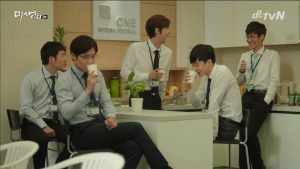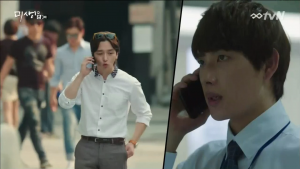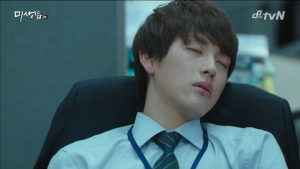Synopsis: Although it has gotten better for Geu-rae, he still struggles to adjust to Korean office culture and coworkers. However, with much effort, he is getting approvals from his superior officer somewhat. Also, he chooses his partner for upcoming project.
Education have been enlightening countless societies around the globe for centuries. For example, advanced knowledges from engineering fields trained so many to help revolutionize communications in general inventing various technologies including cellular phones and the Internet. What education provides inevitably improve human lives in numerous ways over the centuries. Consequently, seeing the wonders of education, human societies did not hesitate from increasing and expanding places where they can train their new generation. However, the expansion of education also has negative side effects. At this point, it is critical to note education creates inequality as Kim and Choi stress (2015).

In the drama, Misaeng, the main character, Jang Geu-rae, continues to suffer from his lack of education. His colleagues, although it has been somewhat better than the episodes 1 and 2, continue to look down on him and his ability and capabilities to work. Geu-rae is not someone his colleagues want to be partnered with. Moreover, the partner he did find constantly ignore Geu-rae’s attempt to communicate. As Kim and Choi suggest after democratization Korean government deregulated education (2015). Especially when education is commonly considered as an instrument which can provide crucial social mobility, Korean people “wanted elite schools and were ready to spend accumulated private assets for their children’s education according to Park, Byun and Kim (as cited in Kim and Choi 2015, 446). Some might argue that Geu-rae should have gotten his education like everyone else. However, getting education is not always easy for everyone. With the ever-growing desire for private tutoring to supplement education, people with higher income invest significantly more into private tutoring than people with lower income according to Kim and Lee (2010). In turn, the children who have parents with higher income are more likely to gain entrance to higher education since they would likely to have more money invested into their private tutoring. Consequently, with prestigious education, it would definitely be easier for the children of parents with higher income to get jobs and compete in Korean society. Especially in Gue-rae’s case, whose family could only afford a “cheap” suit, it is less likely that Gue-rae had gotten much investments from his parents for academic private tutoring. Even though it is known that Geu-rae demonstrated outstanding academic performance according to his mom, his lack of education alone is still more than enough to put him in a position in which he is continuously discriminated and looked down upon by his colleagues.

It is clear that the deregulation and expansion of education led Koreans to better living standard and much enlightenment. However, such advancement of education also created inequality among Koreans. It is more difficult for people who cannot afford private tutoring to get jobs in first place. In some miraculous cases in which these people do get jobs, they are further discriminated at their work. Consequently, such discrimination might interfere with their experience at work reducing their work efficiency and dissatisfaction possibly resulting in some serious career related consequences including not being able to succeed in promotion opportunities. Furthermore, with less income than those who were promoted due to failed promotion, people who are discriminated would invest less money for their children’s education and private tutor. It is clear at this point that the inequality would become generational. In this regard, education is instrumental in reproducing inequality in Korean society.

Question)
- What would be something that Korean society could do to prevent education from creating inequality?
- What can companies do to reduce such discrimination experienced by people like Geu-rae that we see in Misaeng?
Photos are screenshots from the drama, no copyright infringement is intended.
Works Cited
Kim, Doo Hwan, and Yool Choi. “The Irony of the Unchecked Growth of Higher Education in South Korea: Crystallization of Class Cleavages and Intensifying Status Competition.” Development and Society 44, no. 3 (December 2015): 435-463. Accessed May 31, 2018.
Kim, Sunwoong, and Ju-Ho Lee. “Private Tutoring and Demand for Education in South Korea.” Economic Development and Cultural Change 58, no. 2 (January 2010): 259-296. Accessed May 31, 2018. http://www.jstor.org/stable/10.1086/648186.
Hi Anthony, I really appreciated the way you tied in the educational sector of South Korea with one of the drama’s evident themes. I agree that education has become increasingly unequal, and families are doing whatever they can to provide their children with the best benefits to succeed in their endeavours. The general purpose for getting an education would be to find an outstanding job that can provide a lavish lifestyle. This has been the incentive for students to learn and to go to a prestigious university. This sort of idea can both pressure and stress many of the Korean youth. Something that Korean society could do to prevent education from creating inequality would be to conceive of education as an asset, but not a necessity to have a good life. Furthermore, instead of education being the sole factor of determining someone’s value, extracirricular activities and volunteering opportunities should be supported by the government. I also suggest considering private tutoring to be run by the government, so that the government can equate educational opportunities with everyone. For example, those who can afford private tutoring should be taxed more. I believe the company has not been discriminating against Geu-rae for his educational background, otherwise his connection would not have hired him. It is the internal struggle within the workplace in which he feels discriminated. To reduce discrimination, Geu-rae is working tirelessly and effectively so that he can prove to the company that he is an asset. As we transition throuugh the episodes, we can see that his hard work is paying off as people are able to rely on him for more responsibilities and tasks. Geu-rae is aware of this and wants to continue his efforts within One International.
Hi Anthony, I agree that education creates inequality in Korean society, especially in the workplace. To answer your questions, 1) Since poor family cannot afford the private tutor and it is hard for them to break this inequality, the government and the school should pay more attention and put more efforts to this issue. One of the reasons why students need private tutoring is the school didn’t teach enough knowledge and take care of each student. The government and the school should offer more assistance and support them to a better education.
2) It is the fact that Geu-rae got the position through his connection, which must be seen unfair to the other interns who don’t know his background. This discrimination is understandable. It is just the way they treat Geu-rae is offensive and annoying. We can see from the following episodes, that these interns who make fun of Geu-rae did not pass the test. Therefore, it is important to pay attention to your own achievement rather than listen to others comments. As an intern hired through a connection, Geu-rae must work harder without any complaint.
Hi SeungKi,
I enjoyed reading your insight on the continued discussion of South Korean education within the drama’s underlying themes. Based on the in-class discussions and readings, as well as in the drama, I would also agree with Jordan that it is unfortunate to see that while education can provide valuable knowledge, could contrastingly create major divides to define who has the privilege and access to obtaining the necessary skills and resources for better quality of life or job to move up one’s social standing.
To answer your questions:
1) The inequality problem of education in its entirety is difficult to eradicate through preventative measures, however changing the concept or ideology that higher education does not necessarily equate to having a good life may provide alternatives to achieve the same result. In other words, viewing education as a skilled asset or ticket to entering the workforce. Living in an intense socially stratified society where everyone has similar (high) qualifications to compete for the same jobs, is indisputable; and off puts room for creativity to utilize an individual’s strengths to grow in this kind of environment. I also agree with Jordan that having government support to volunteer opportunities, extracurricular activities or career developing programs, etc. may provide solace for some. To note on the notion of “universal education”: having some sort of agreement between the government and private tutoring, to come to a consensus in this sense, could provide the same educational opportunities for everyone.
2) Discrimination within the workplace is difficult to avoid altogether, as it is happens anywhere you go – around the interactions with others, and due to social hierarchical values and tensions within the system internally, etc. – makes one feel that way, especially for those like Geu-rae. While it can be difficult to change the attitudes or minds of others, those like Geu-rae, would have to focus on how to prove himself by “working hard, and working smart,” to make it through together as a “team” to not inconvenience or setback others. Though it may take time, the process in seeing Geu-rae transition and grow throughout the episodes, shows that his efforts are not in vain.
Hi Anthony,
I appreciate how you recognize how far South Korea has come due to educating the masses. With such a high high school graduation rate, and many people attending college and university; Korea has become highly developed, and highly recognized internationally for its economic success. As Koreans do not have many natural resources nor land, only education and resourcefulness has created the country it is today.
Some steps that Korean society could do to prevent an unequal gap forming due to education, is to not just prevent the wealthy and powerful from providing their children tutoring and ways to get ahead, but to empower the people struggling at the bottom of society, creating social programs to assist them in receiving good education.
There can be incentives and/or fines for large companies to discriminate based on the name of the college, but they should employ people with hard work and determination for roles that do not require higher education. It is hard to prevent workplace covert-discrimination, but with effort and time, people can overcome.
Hi Seung Ki Son,
I liked your comment that deregulation and expansion of education led to Korean society suffering from issues of inequality. Though I think deregulation was probably the most detrimental part.
Here are my answers to your questions:
Question #1
Korean society could prevent education from creating inequality by:
Having programs or bursaries of those from low-income families the chance at having a better education.
Promoting or giving financial help to schools that have a higher amount of children from low-income houses.
Promote stories of those that have done well in society without a high level of education but instead used their ‘street smarts.”
Have companies give equal chances for prospective employees (no matter their education) in order to prove themselves to be good for the job.
Promote jobs that are seen as less desirable (like a plumber or factory worker) but still important in Korean society. Promote them both in their image; as well as giving benefits or higher salaries to those that work in those jobs. This way their will be less of a wage gap which is a large cause of education influencing inequality in Korean society.
Question #2
There are a few things a company can do to stop or at least prevent discrimination from occurring. These are:
1) Change company policies to prevent such discrimination. Have a third party section of your company (like HR, Human Resources) to interfere in cases like Geu-rae by playing moderator and sort out any issues. Or in extreme cases, cut wages, suspend, or even fire those responsible for discriminating against employees. A negative environment is never a good idea for a company.
2) Allow opportunities for people inside the company to get to know each other through company team building exercises and retreats. As the more you know someone the less likely you will be to discriminate against them.
3) Promote a work environment where victims feel safe to tell someone about their problems with co-workers. If a person stays silent about discrimination like Geu-rae others who are equally or even more discriminated wont speak out and issues will continue until it becomes unbearable.
Sorry for the late reply
1) What would be something that Korean society could do to prevent education from creating inequality?
One way the society can fix inequality is by introducing a progressive tax system. This system will tax absurd amounts of money from the rich and use that money to assist the poor. The reason why I do not suggest making the education equal is because people have different level of talents. When a talented person is restricted in their education, it is unfair for them and also will lower their potential future. It will also harm the economy as these talented people will not be able to learn to their fullest potential and contribute to the society. Instead of giving equal opportunities, achieving equal results are much more important. By taxing the rich, and use the money to assist the poor, it can guarantee a decent standard of living. If the focus is only in equal opportunity, then the results can be bad for the unlucky members of society.
2) What can companies do to reduce such discrimination experienced by people like Geu-rae that we see in Misaeng?
Prejudice in an office environment is unavoidable. Instead of aiming to eliminate all discrimination, one can avoid so by keeping private information secured. Discrimination like Jang Geu-rae’s is based in the society. It is not simply something that can be avoided. Instead, Geu-rae must be able to prove that he deserves his position. If he is unable to do that, then the discrimination will not stop. The only thing the company can do to stop gossips like this is to not leak any personal background information. Other than that, it is not possible.
Seung Ki, well-done, and good job bringing the readings, though I wonder why you didn’t put page numbers in in-text quotations. I also think you could’ve thought a little more about organization of your essay. It would have been better if your second paragraph wasn’t that long–maybe you could’ve divided into two. At the same time, several sentences in the last paragraph repeat what you have said in the previous paragraph. For your next essay, it’d be great if you could think a little more about how to better organize/structure your essay.
I thought I did not have to write page number if i don’t use direct quotation? Should i be putting page numbers even in case i paraphrase? Of course I will work on my structure on my next one! thanks Ms. Choi!
Yes you still need to, even if you don’t include direct quotations–the only case where you don’t have to put page numbers is when you are citing an idea that is repeatedly referenced in the article.